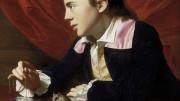By today's standards, Harvard College before the Civil War was a provincial academy, competent (judged Henry Adams) at preparing students to become "respectable citizens," but effectively indifferent to the advances in knowledge beginning to shape the modern world. Yet one early member of its teaching faculty stands as a signal exception. George Ticknorinvited in 1816 to become Smith professor of the French and Spanish languages and literaturesmay be called the first Harvard scholar who would be warmly welcomed into the University faculty of 2005, just as he was the first (outside the traditional fields of divinity and rhetoric) to hold a named chair in the humanities.
Not himself a graduate of the College, Ticknor had followed his father, a Boston merchant, to Dartmouth in 1805, though of his two college years he remarked late in life, "I learnt very little." Back in Boston, his education began in earnest. He took up the serious study of Latin and Greek with the Reverend John Gardiner of Trinity Church and subsequently read for the law. But his heart remained in humane learning and, with his father's approval, he proposed to consolidate his studies at a European university: with Napoleon's downfall in 1815, the continent was once again open to American visitors. By then Ticknor had read with excitement Mme. de Staël's momentous book De l'Allemagne, with its report of dramatic advances in German philosophy and literature, as well as a pamphlet describing the University of Göttingen's revolutionary system of study. These revelations, augmented by an Englishman's account of the treasures in that university's library, convinced Ticknor to make Göttingen his destination.
But before leaving for Europe, he broadened acquaintance with his own country. Traveling south, he dined with President Madison and journeyed to Monticello, where Thomas Jefferson reflected on his own years in Europe and offered letters of introduction to surviving friends in France. As a result, when Ticknor did reach Paris, he was greeted as the newest representative of the upstart American republic and what it signified to European liberals. Mme. de Staël herself, though seriously ill, was eager to see him and declared with animation about the United States, "You are the vanguard of the human race, you are the future of the world."
Twenty months at Göttingen, however, taught Ticknor something different: in humane learning, America was well in the rear. He found his Greek tutor, only two years his senior, far beyond him in breadth and precision of knowledge. "What a mortifying distance there is," he wrote his father, "between a European and an American scholar. We do not yet know what a Greek scholar is; we do not even know the process by which a man is to be made one."
Reflecting on his experience of German academic discipline, Ticknor resolved to apply its methods at Harvard. For President John Kirkland he wrote out a comprehensive plan for a full-scale departmental program on the German model, including lectures in the prescribed languages. When he found that the prevailing conditions of instruction at the College stood in his way, he set about promoting an across-the-board reform of the entire academic program. "A great and thorough change must take place in its discipline and instruction" to make sure, he addedwith an asperity not likely to endear him to colleaguesthat the College would at least "fulfill the purposes of a respectable high school."
 |
| A formal carte de visite photograph of Ticknor. Such images were popular for publicity purposes and personal use. |
| Photograph courtesy of the Harvard University Archives |
President Kirkland acknowledged the need for reform and was sympathetic to Ticknor's proposals, but the faculty at large was not. "The resident teachers," Ticknor told a friend, "declared themselves against all but very trifling changes." The Harvard he envisioned and for which he had prepared himself would begin to materialize only under President Charles William Eliot, a half-century later.
Ticknor never really settled into the still provincial Harvard community. Scrupulous about his duties, he offered courses on Dante and Shakespeare as well as on his appointed French and Spanish subjects. (His services are commemorated by Ticknor Lounge in Boylston Hall, the present home of Romance language studies.) But he chose to reside in Boston rather than Cambridge; his elegant townhouse at the corner of Park and Beacon became the setting for a life closer to that of a prosperous patrician than of a dry-as-dust pedagogue. What he lived for, most of all, were his return visits to Europe. In preparing his monumental History of Spanish Literature, published in 1849, he assembled an extraordinary library of books and documents, rescuing many from slow disintegration in neglected archives and vaults. He maintained cordial relations with scholars, intellectuals, and cultivated aristocrats in several countries who shared his interests.
Although he resigned from Harvard in 1835 to concentrate on his History, he remained hopeful about the College's future. Writing in 1859 to the eminent British geologist Charles Lyell, he declared that, with "the best law school in the country, one of the best observatories in the world, a good medical school...[and] the Lawrence Scientific School, [we can become] a true university, and bring up the Greek, Latin, mathematics, history, philosophy, etc., to their proper level. At least I hope so, and mean to work for it."
Warner Berthoff is Cabot professor of English and American literature emeritus.





